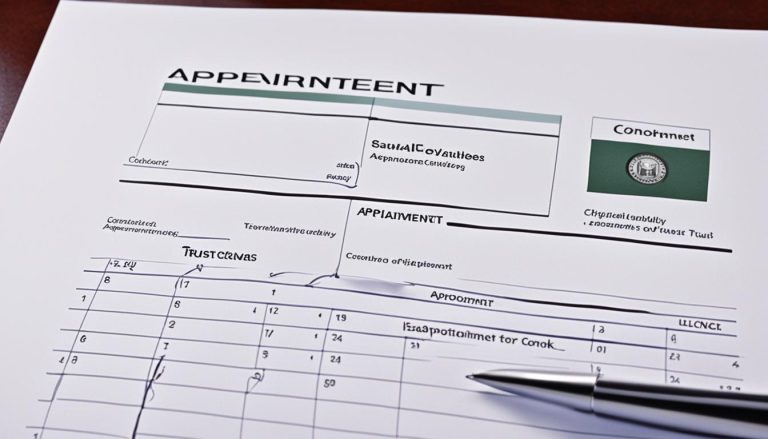Changing title deeds is a pivotal step in the property transaction process in England and Wales. Once an application is received by HM Land Registry, the legal ownership rights are secured. This ensures the protection of the transaction from the moment the application is received, rather than on completion. Due to the large number of applications processed daily, the HM Land Registry does not provide an average timeline for changing title deeds.
However, for urgent cases where delays could cause significant issues, HM Land Registry offers a free expedite service. This service processes most urgent applications within 10 working days. Recognising the need for faster service, HM Land Registry is actively working on improving service speeds through recruitment and digital process enhancements. These measures are aimed at streamlining land registration and reducing the time it takes to change title deeds.
Steps Involved in Changing Title Deeds
The process of changing title deeds involves several critical steps, which must be followed meticulously to ensure the transaction is successful. Each stage is designed to validate and secure ownership, streamlining the speed of changing property title deeds.

Property Searches
Property searches are conducted by conveyancers to gather pertinent information about the property. These searches encompass local land charges and environmental assessments, which can take approximately 1-2 days if manual handling is required.
Contract Exchange
Following property searches, the contract exchange occurs between the buyer and the seller, formalising the agreement terms. This step is pivotal in solidifying the transaction and setting the stage for completion.
Completion
Completion is the moment when ownership officially changes hands. This stage signifies the final agreement between the involved parties and ensures that all legal and financial obligations have been met.
Registration
Lastly, the registration step updates the Land Registry with the new owner’s details. Automation in this step has significantly impacted how quickly can title deeds be updated, with over 30% of applications being processed within minutes. This advancement directly influences the updating land registry documents timeframe, enhancing overall efficiency.
Factors Affecting Title Deed Transfer Time
Several factors can significantly influence the average time for title deed alteration. Understanding these can help homeowners anticipate potential delays and manage their expectations effectively.

Chain Length
The duration for title deed modification can be substantially affected by the length of the transaction chain. Each additional link in the chain introduces new dependencies and potential delays, as each transaction completion depends on another. Consequently, shorter chains often result in a quicker title deed amendment process duration.
Property Type
Another critical factor is the type of property involved. Freehold properties generally experience fewer complications compared to leasehold properties, which can have multiple layers of agreements and permissions to navigate. This distinction often impacts the duration for title deed modification, making some property types more time-consuming to transfer.
Issues with the Property
Existing issues with the property can also extend the title deed amendment process duration. Disputes, outstanding debts, or legal matters related to the property need resolution before the title can be altered, leading to a longer duration. Such issues require additional documentation and approvals, which add to the overall time needed.
Typical Timeframes for Changing Title Deeds
The timeline for title deed transfer can vary significantly based on the specifics of the application. For simple, straightforward changes to existing registered titles, automation often plays a key role, with over 30% of such changes completed instantly. However, more complex alterations, such as changes in ownership or naming, generally require about 10 weeks to finalise, and in some cases, this transfer deed duration can extend up to 8 months.
When dealing with first-time registrations or new infrastructural projects, the title deed change timeframe can be substantially longer. These types of applications may stretch out to 17 months or beyond due to their intricate nature. Consequently, the overall timeline for title deed transfer ranges from immediate completion for straightforward cases to multiple months for more complicated scenarios.
The table below provides a detailed look into average timelines for various types of title deed changes:
| Type of Application | Transfer Deed Duration |
|---|---|
| Automated Simple Changes | Instant |
| Complex Changes (e.g., Ownership/Naming) | Up to 8 months |
| First-time Registrations | 17 months or more |
| New Infrastructural Projects | 17 months or more |
Being aware of the typical timeframes helps manage expectations when undertaking a title deed change. Factors such as the nature and complexity of the application are crucial in determining the overall duration.
How Long Does It Take to Change Title Deeds?
The timeframe for changing title deeds varies considerably. The legal process of changing title deeds is not easily pinned to a specific duration due to multiple factors that can affect the process. Based on data as of April 2024, straightforward cases can experience immediate automation and completion, while others, most commonly complex cases and first-time registrations, can span several months.
HM Land Registry’s efforts towards increased recruitment and automation are expected to reduce the backlog and speed up the timeline for title deed transfer. However, the exact duration for title deed changes remains variable. Customers are advised to consult tools such as the estimated completion date feature within the Land Registry portal for specific cases. For detailed insight, the following table outlines different scenarios affecting the title transfer deed period.
| Scenario | Estimated Timeframe | Factors Influencing Duration |
|---|---|---|
| Straightforward Cases | Immediate | Automation, Low Complexity |
| Complex Cases | Several Months | Multiple Dependencies, High Complexity |
| First-Time Registrations | Up to 17 Months | Detailed Scrutiny, Additional Verification Needed |
Expedite the Title Deed Transfer Process
For those needing to expedite the title deed transfer, especially when delays could result in significant issues, following certain steps can lead to a faster process. Understanding the duration to update title deeds and knowing how to speed up deed transfer will make the procedure more efficient.

Required Documentation
One crucial step to expedite the title deed transfer process is ensuring all required documentation is in order. This includes contracts, mortgage offers, and any paperwork that highlights transaction dependencies. Having this documentation ready can significantly reduce the timeline for deed change, allowing for swifter action when applying for expedited services.
Working with a Professional
Engaging a professional conveyancer can further streamline the process. These experts ensure that all documentation is accurately prepared and submitted without delay. They can also offer guidance on how to speed up deed transfer, helping you navigate through potential pitfalls and ensuring all critical deadlines are adhered to. An organised approach in working with professionals can make a significant difference in reducing the duration to update title deeds.
| Factor | Impact on Timeline | Action |
|---|---|---|
| Complete Documentation | Reduces delays | Prepare all necessary documents in advance |
| Professional Assistance | Ensures timely processing | Hire experienced conveyancers |
| Organised Records | Facilitates quick processing | Maintain orderly and up-to-date records |
Common Challenges and Delays in Title Deed Changes
Navigating the title deed amendment time-frame can be fraught with challenges, largely due to external factors that have significantly impacted processing times.

COVID-19 Impact
The COVID-19 pandemic created unprecedented disruptions across many sectors, including the Land Registry. The impact on transferring ownership has been substantial, leading to prolonged registration delays. The influx of property transactions, combined with staffing constraints, has elongated timelines for processing deeds.
Stamp Duty Holiday Impact
The Stamp Duty holiday of 2022 further complicated matters by significantly increasing the volume of property transactions. This surge in applications overwhelmed the system, making it even more crucial to expedite title deed processing where necessary. Despite measures to improve capacity through hiring and digital improvements, stakeholders continue to feel the ripple effects, highlighting the need for expedient solutions.
Conclusion
The title deed amendment process is undoubtedly crucial in the legal conveyancing of property ownership in the United Kingdom. It is evident that several factors, including property type, the complexity of the application, and unforeseen external pressures such as the COVID-19 pandemic, can significantly influence the duration of this process. Thus, applicants must always remain vigilant to potential delays when planning their timelines.
Efforts are being made by HM Land Registry to address these inefficiencies through increased recruitment and enhanced digitisation initiatives. These measures are anticipated to bring about smoother and swifter processing times in the foreseeable future. Understanding the title deed change effective timeline and being prepared with the necessary documentation are essential steps to ensure that the process is as seamless as possible.
Moreover, enlisting professional guidance, particularly from accredited conveyancers, can help navigate the intricacies of the update title deed details accurately. This approach not only mitigates the risks associated with potential delays but also ensures that the legal and administrative aspects of property ownership transfer are handled with due diligence. While transformations within the HM Land Registry are ongoing, the journey to streamline and perfect the title deed modification process remains a priority that promises enhanced efficiency for all stakeholders involved.
FAQ
How do property searches affect the timeframe for changing title deeds?
Property searches are critical and provide essential information about the property. These searches, including local land charges and environmental assessments, can take approximately 1-2 days if manual handling is required.
What factors influence the title deed transfer time?
Several factors can affect the duration of title deed transfers, including the length of the transaction chain, the type of property (leasehold vs. freehold), and any existing issues with the property such as disputes or outstanding debts.
What are the typical timeframes for changing title deeds?
The typical timeframes can vary widely. Simple applications might see immediate automation and completion, but complex cases and first-time registrations can span several months, sometimes extending up to 17 months or more.
How can I expedite the title deed transfer process?
The HM Land Registry offers a free expedite service for urgent applications. To use this service effectively, it’s crucial to have the required documentation, such as a contract or mortgage offer, ready and consult professional conveyancers for preparation.






